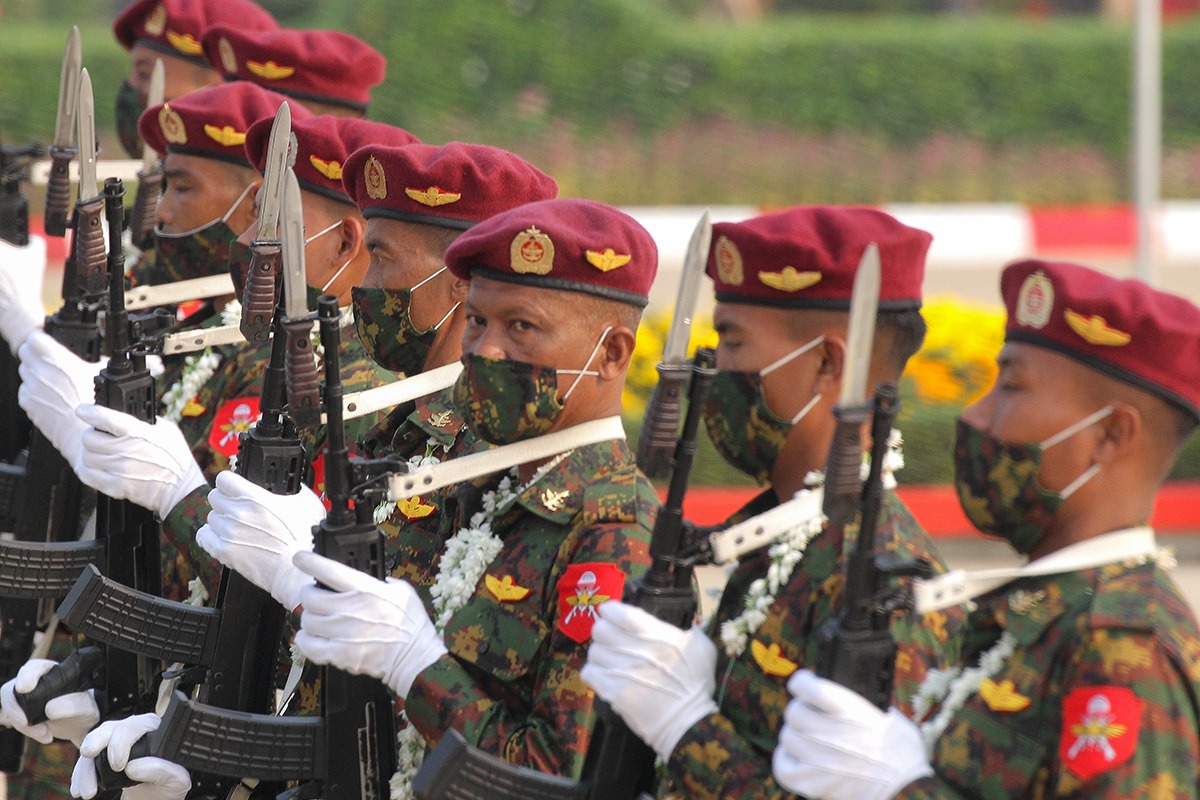When is a victory to the winner so costly that its price is devastating? An example of this from four thousand years ago illustrates the problem. In 279 BCE, King Pyrrhus of Epirus in what is now the Balkans defeated the invading Roman legions, but in doing so destroyed the potential of his state. He is said to have remarked that he could not afford another victory. His concession has contemporary relevance.
That Pyrrhic victory has become the symbol of long-term loss but shorter-term gain. The Myanmar military’s February 1 coup, their fourth putsch in recent history, and its bloody aftermath with the military in titular, if contested, control is such a Pyrrhic victory. It will be as destructive of the state’s potential as it has been to the military’s reputation.
It was not always thus. The military began as a most desirable career with high prestige thanks to its role in Myanmar’s struggle for independence. In 1958, the military’s first coup, known as a “caretaker government,” lasted eighteen months and, while autocratic, temporarily stopped state decline. The second coup of 1962 established an arbitrary socialist system and began popular disappointment with the military. The third coup, in 1988, violently and bloodily quelled a people’s revolution and was destructive of the military’s reputation, which it tried to rebuild through reforms two decades later.

Now Myanmar is in a military-induced crisis. The military has tried to subdue, but has not eliminated, the myriad civil and ethnic rebellions and protests that emanated from their February coup, as well as the decades-old ethnic conflicts in the borderlands. It has employed armed power temporarily to prevail at a tremendous cost. The military will declare their efforts a success, reaffirming their promise to return the state to some form of representative government in two years, if not one under an internationally acceptable definition of democracy. The military is evidently intent on manipulating the future political process, destroying the civilian National League for Democracy Party as a political force, and ensuring through spurious legal means the political isolation of Daw Aung San Suu Kyi.
The Myanmar military may claim victory, but it is an illusion that will be internally and externally questioned, and is ephemeral, and costly to its own influence and the future of the state. It will resolve none of the internal, critical crises that affect the lives of its diverse population. It will, instead, exacerbate ethnic enmity. It will increase unemployment. It will cast more people below the poverty line. It will engender hatred of the military for those thousands of families who have lost kin and friends. It will foster distrust of future military actions and promises, even if they are benign. It will destroy the reputation of state institutions and create suspicions of any form of central administration and control. It will be an unmitigated socio-political and economic disaster.
The coup and its aftermath have severely limited the prospects for international economic cooperation, even though the moral necessity for humanitarian assistance from donors may remain. Regional states, perhaps reluctantly, will play the game of dealing where present power lies in the country—with the military, for Myanmar is potentially a rich source of raw materials in a strategic location. Such foreign powers may feel less constrained in exploiting Myanmar because of its raw, unvarnished reputation. The industrialized West will continue to be skeptical of policies emanating from any future government with the imprimatur of the military, even though ostensibly civilian. Russia has emerged as the closest ally of the coup leader, Senior General Min Aung Hlaing.
And in their own, parochial interests, the military will likely find its reputation within the state tarnished beyond any perceptible, manufactured gloss. It may continue to recruit an officer class from the sons of military families, but the spirit of sacrifice that once was a hallmark of the military has long been lost and the coup will simply and cynically exacerbate self-service as a guiding force. Youth who have experienced the relative freedoms of the previous decade, those who are dedicated to the welfare of the diverse Myanmar peoples, and those who understand the country’s potential international role will avoid a military career. Many have sought exile, and many more will follow, depriving the state of much of its intellectual capacity.
Seeking personal and institutional pride, the coup was instigated from the top. The military already had within its own established legal parameters long secured its domination of those concerns it regarded as in the national and its own interests. The fourth coup was, thus, either based on personal aggrandizement or miscalculations. It fosters a coup tradition—perhaps not yet on the scale of Thailand, but becoming an established means to personal, institutional, or ideological power. This is a dangerous pattern, and one difficult to break. It effectively weakens the institutions that could provide continuity of good governance and places the future in doubt.
The coup was a self-inflicted wound, not immediately fatal to the military, but clearly one that will prevent a resurgence of national growth, equity, and reputation. The military may claim that it is not treated either locally or internationally with the dignity it feels it is due, but the military itself has destroyed the basis for such respect. And it will be the Myanmar people who will suffer.
King Pyrrhus understood that his victory came at a devastating cost to his state. The Myanmar military, alas, does not seem to have grasped this historical analogy.
David I. Steinberg is distinguished professor of Asian studies emeritus, Georgetown University
You may also like these stories:
Myanmar Junta’s Caretaker Government on Course to Fail
Myanmar’s Military Chief Staged a Coup. But He Did Not Act Alone
Rohingya Without Myanmar ID Not Being Given COVID-19 Jab: Junta

















